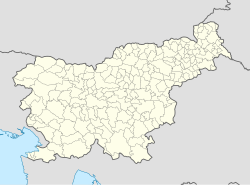Borovec pri Kočevski Reki (pronounced [bɔˈɾɔːʋəts pɾi kɔˈtʃeːu̯ski ˈɾeːki]; German: Morobitz,[2][3] Gottscheerish: Mərobits[4]) is a settlement in the Municipality of Kočevje in southern Slovenia. The area is part of the traditional region of Lower Carniola and is now included in the Southeast Slovenia Statistical Region.[5] It also includes the former villages of Draga (Suchen), Ravne (Eben), Pleš (Plösch), and Inlauf (Inlauf)[2][3] as hamlets. The former village of Ajbik (or Ajbig, German: Eibig[6]) was annexed by Borovec pri Kočevski Reki on 30 January 1953.[7][8]
Borovec | |
|---|---|
| Coordinates: 45°32′46.98″N 14°47′4″E / 45.5463833°N 14.78444°E | |
| Country | |
| Traditional region | Lower Carniola |
| Statistical region | Southeast Slovenia |
| Municipality | Kočevje |
| Area | |
• Total | 21.25 km2 (8.20 sq mi) |
| Elevation | 670.3 m (2,199.1 ft) |
| Population (2002) | |
• Total | 57 |
| [1] | |
Name
editBorovec pri Kočevski Reki was attested in written sources as Barobetz in 1498.[9] The name of the settlement was changed from Borovec to Borovec pri Kočevski Reki (literally, 'Borovec near Kočevska Reka') in 1953.[8] The name is derived from the Slovene common noun borovec 'pine'.[10] In the past the German name was Morobitz.[2]
Geography
editBorovec pri Kočevski Reki is a compact village extending along the road from Kočevska Reka to Dolnja Briga in the Borovec Valley (Slovene: Borovška dolina), which is separated by a low hill from the Gotenica–Kočevska Reka Valley (Slovene: Goteniškoreška dolina). Surrounding elevations include Mount Cerk (1,192 m) and Mount Mož (1,125 m) to the west, Krempa Hill (944 m) to the south, Ravne Hill (846 m) to the north, and Ajbig Hill (765 m) to the east. The soil is loamy and sandy, and water is supplied from springs north of the settlement.[11] Prior to World War II, the area was known as Kočevska Švica (Kočevje Švica), as it developed as a small tourist resort with temperate climate and a starting point for hiking.[12]
History
editIn the land registry of 1498, Borovec had five full farms and two half farms. The registry of 1574 recorded 10 half-farms, one full farm, and two cottages in Borovec, three full farms divided into halves in Ravne, and a full farm in Pleš. By 1770, Borovec had grown to include 25 houses, and Pleš had grown to six houses. Before the Second World War, the village had a mixed Slovene and Gottschee German population. Borovec pri Kočevski Reki is one of the oldest villages in the Kočevje area with an original Slovene population. A steam-powered sawmill operated in the village but was burned during the war, when Ravne also came under bombardment. The Gottschee Germans were evicted in 1941, and after the war people from various parts of Slovenia settled in the village.[11]
Church
editThe local church, dedicated to Saint Michael, used to be a parish church, but now belongs to the Parish of Banja Loka. It was built between 1858 and 1863 and burned down by the Italian army in 1943.[13] In 1952 the remains of the church were removed and only the foundations of the original building are preserved.[14]
References
edit- ^ Statistical Office of the Republic of Slovenia
- ^ a b c Leksikon občin kraljestev in dežel zastopanih v državnem zboru, vol. 6: Kranjsko. 1906. Vienna: C. Kr. Dvorna in Državna Tiskarna, p. 34.
- ^ a b Ferenc, Mitja. 2007. Nekdanji nemški jezikovni otok na kočevskem. Kočevje: Pokrajinski muzej, p. 4.
- ^ Hans Tschinkel, Grammatik der Gottscheer Mundart
- ^ Kočevje municipal site
- ^ Ciglar, Milan. 1976. Untersuchungen über die Folgen der Entvölkerung einer waldreichen Kulturlandschaft, dargestellt am Beispiel des Gottscheer Landes: ein Beitrag zur Quantifizierung einer Kulturlandschaft als Grundlage für die Raum- und Landschaftsplanung. Doctoral dissertation. Freiburg: Author, p. 201.
- ^ Razširjeni seznam sprememb naselij od 1948 do 1964: preimenovanja, združevanja, odcepitve, pristavki, razglasitve in ukinitve. 1965. Ljubljana: Zavod SR Slovenije za statistiko, p. 5.
- ^ a b Spremembe naselij 1948–95. 1996. Database. Ljubljana: Geografski inštitut ZRC SAZU, DZS.
- ^ "Borovec pri Kočevski Reki". Slovenska historična topografija. ZRC SAZU Zgodovinski inštitut Milka Kosa. Retrieved March 6, 2021.
- ^ Bezlaj, France (ed.). 1977. Etimološki slovar slovenskega jezika, vol. 1, A–J. Ljubljana: SAZU, p. 34.
- ^ a b Savnik, Roman, ed. 1971. Krajevni leksikon Slovenije, vol. 2. Ljubljana: Državna založba Slovenije, p. 217.
- ^ "Borovec pri Kočevski Reki" [The Lost Villages of Kočevje]. Izgubljene kočevarske vasi (in Slovenian). Retrieved 25 December 2020.
- ^ Borovec (in Slovene and German)[dead link]
- ^ Slovenian Ministry of Culture register of national heritage reference number ešd 1595
